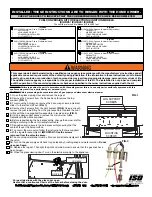
Installation
900683-01F, 10/2018
Innovative Hearth Products
DRT3500 Series Direct-Vent Gas Fireplaces
25
Clearance to combustibles
Maintain the minimum clearance to combustibles (e.g., framing, attic, ceiling insulation, etc.).
For all vertical runs:
• 1” (26 mm) from all sides
NOTE: Attic insulation shield (H3907, see Page 47) must be installed when blown or loose-fill insulation is used,
and is required for all attic installations.
For all horizontal/inclined runs:
• 3” (77 mm) from the top
• 1” (26 mm) from the sides
• 1” (26 mm) from the bottom
11.
Install the Vent System
Install the Vertical Termination Vent System
These instructions should be used as a guideline and do not supersede local codes in any way. Install venting
according to local codes, these instructions, the current National Fuel Gas Code (ANSI-Z223.1) in the USA or the
current standards of CAN/CGA-B149.1 in Canada.
Ensure clearances are in accordance with local installation codes and the requirements of the gas supplier.
Dégagement conforme aux codes d’installa tion locaux et aux exigences du foumisseunde gaz.
Vertical vent systems terminate through the roof. The minimum vent height above the roof and/or adjacent walls
is specified in ANSI Z223.1 (In Canada, the current CAN/CGA-B149.1 installation code) by major building codes.
Always consult your local codes for specific requirements. A general guide to follow is the gas vent rule (Table 6).
The following figures and their associated vertical vent tables illustrate the various configurations that are possible
for use with these fireplaces. Secure Vent
®
pipe is shown in these figures; Secure Flex
®
pipe may also be used.
A table summarizes each configuration’s minimum and maximum vertical and horizontal length parameters for a
variety of applications.
1. Refer to Figure 23 and Tables 16–19 on Pages 28–29 to select the type of vertical installation desired. Elbows
are available in 90° and 45° configurations. Refer to Figure 17 on Page 23 for the SV4.5E45 and SV4.5E90
elbow dimensional specifications.
Vertical (Straight) Installation
1. Determine the number of straight vent sections required—See Effective Vent Length on Pages 23–24 for
more information. Plan the vent lengths so that a joint does not occur at the intersection of ceiling or roof joists.
Figure 18 - Vertical (Straight) Installation
SV4.5FA or SV4.5FB Flashing
AND SV4.5SC Storm Collar
SV4.5VF
Firestop/Spacer*
1” (26 mm) Minimum
Clearance to Combustibles
SV4.5CGV-1 Termination
SV4.5L6/12/24/36/48
Vent Sections
*When using Secure Flex,
use Firestop/Spacer
SF4.5VF.
Max. 60 ft
(18.3 m)
Attic Insulation Shield
Cat. # H3907 (required)
















































